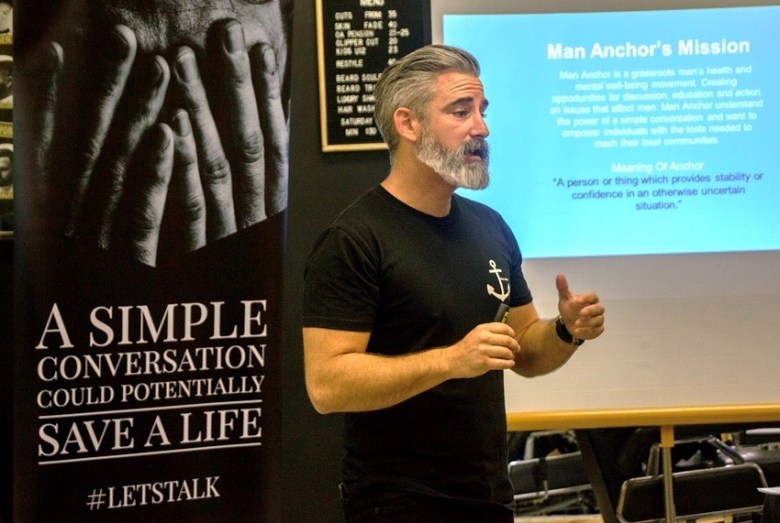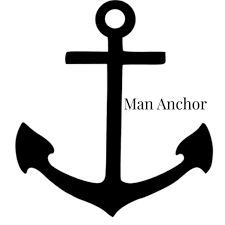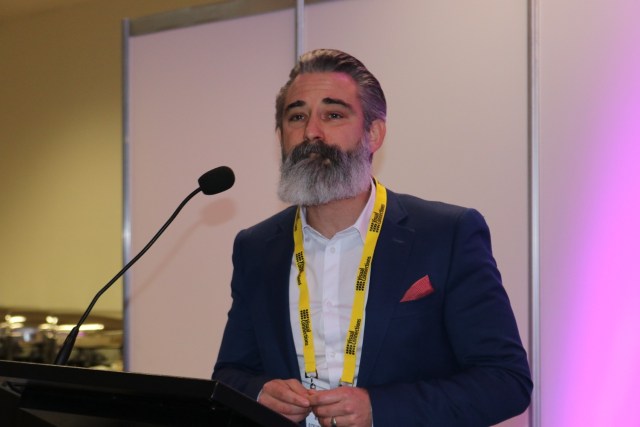
Man Anchor, a grass roots mental health and wellbeing movement set up by Bottcher’s Steven Gamble, has adapted its workshops and programs so they can be delivered online to help keep everyone’s mental health in check during the coronavirus crisis.
The one hour Lets Talk and four hour Communication with Care workshops have been tested and are ready to delivered online, while the Mental Health First Aid course is expected to be ready for online delivery by the end of May.
Gamble says the programs are a fantastic way for business owners and staff to engage and upskill while working remotely and help them learn how to support not only their own wellbeing, but that of the people around them. 
“We have three programs starting from our one hour Lets Talk workshop which is a relaxed introduction to mental health,” Gamble told Sprinter.
“This program has proven to be a fantastic way to build a positive culture around mental health within the workplace.
“Our Communication With Care program is a four hour workshop designed to give the participants the core skills to communicate and support and individual if faced with stress, distress or crisis. We look at positive ways to provide support and how-to self-care.
“Our final program is Mental Health First Aid which will be ready to relaunch as the online adaptation by the end of May. This program provides the skills to support a person in crisis or worsening mental health. The course covers a wide spectrum of disorders everything from panic attacks to suicide. On successful completion the participant will receives a three-year certification in Mental Health First Aid.”
Gamble says it is completely understandable for people to have heightened levels of stress and anxiety at this time, but adds it is crucial to address these issues before they have the chance to escalate into a crisis or illness.
“Like most health-related illness early intervention is the key to preventing someone becoming unwell and this is the same with your mental health. With early intervention and treatment you can prevent the “slippery slope or slow fall,” Gamble said.
The signs of mental health decline – what to look out for
The signs can vary from person to person but mental illness commonly affects a person’s feelings and emotional state, behaviour and physical state.
Behaviour: Becomes withdrawn or socially isolated in correspondences, has trouble completing tasks, engages in substance abuse including prescription drugs and acts recklessly.
Emotions and feelings: Has feelings of worthlessness, being overwhelmed, frustrated, angry, indecisive and low confidence.
Physical: Sick and run down, churning stomach, loss of appetite, constantly tired or significant weight gain or loss.
If you see these signs and symptoms together in yourself or a family member, colleague or friend, it is important to reach out and ask the person how they are feeling and let them know you are there for them. It is also important they contact their GP for a treatment plan.
“It’s important that we have open conversations around mental health to give the people close to us the “green light” and let them know we are here to support them,” Gamble said.
“The rate someone’s mental health can turn from well to unwell can vary person to person. A person that you would say has had a good mental health in the past could be triggered by an event or series of events which could escalate into crisis rapidly but once again if we understand the symptoms in ourselves or the signs in others we can quickly seek support and treatment.”
What to do if you or someone you know is suffering from mental illness
Gamble says, “Reach out and tell someone how you are feeling a friend or family member and go see your GP. The GP will help to put together a plan to support your health.
“If you feel yourself becoming unwell it is important that you seek support. You can start by reaching out to a friend, family member and your local GP. The GP can help put together a plan to support your health.”
For more information please visit mananchor.com.au or email steven@mananchor.com.au
Who to call
000 if an emergency
NSW Mental Health Line 24/7 1800 011 511 – a phone based mental health triage service for anyone needing advice about mental health matters
Lifeline 13 11 14 https://www.lifeline.org.au
Suicide Call Back Service 1300 65 94 67 https: www.suicidecallbackservice.org.au
Beyond Blue 1300 22 46 36 https:// www.beyondblue.org.au/home
Mens Line 1300 78 99 78 https:// mensline.org.au
1800RESPECT – Domestic Violence 1800 73 77 32 and Sexual Assault
https:// www.1800respect.org.au
NSW Domestic Violence Line 1800 65 64 63 http://www.domesticviolence.nsw.gov.au
NSW Rape Crisis Centre 1800 42 40 17 http://www.nswrapecrisis.com.au
Kids Help Line (5-25y) 1800 55 1800 https:// kidshelpline.com.au
Q-Life 1800 184 527 https://qlife.org.au
Comment below to have your say on this story.
If you have a news story or tip-off, get in touch at editorial@sprinter.com.au.
Sign up to the Sprinter newsletter




It’s Great to see Man Anchor Expanding to Online Programs, It’s definitely a passion of Steven Gamble’s to Help breakthrough the stigma of suicide and to prevent deaths.